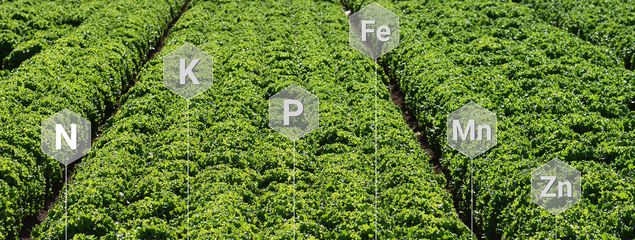
Improve Plant Nutrition
Fertilizer Guidelines for Vegetable Crops in Arizona
Special Sections (4)
N stabilization Products (4.6)
Ammonia volatilization is an important pathway through which soil-applied urea-based nitrogen (N) fertilizers are lost to the atmosphere. Urease inhibitors (UI) block the activity of the enzyme urease which catalyzes the hydrolysis of urea to ammonium, and as such, can reduce ammonia volatilization (110). Products with known efficacy for inhibiting urease activity are N-(n-butyl) thiophosphoric triamide (NBPT) and N-(n-propyl) thiophosphoric triamide (NPPT). These products are most useful in production systems where surface application of urea is practiced. However, surface application of N fertilizers is not common in vegetable cropping systems; hence, these products have limited utility in vegetable production in Arizona.
Leaching is an important mechanism by which N fertilizers, more specifically nitrates, are transported down to soil horizons below the root-zone or to a shallow water table. Nitrification inhibitors (NI) are products that can be used to block the conversion of ammonium to nitrate (111). This is often beneficial because some of the ammonium ions, which are positively charged, adsorb onto the soil cation exchange complex and are released to the soil solution at a slower rate. As a result, it is less prone to leaching than the more readily mobile nitrate ion. Typically, the inhibitors act on the organisms that mediate the nitrification process. Products with known efficacy for inhibiting nitrification are dicyandiamide (DCD), nitrapyrin, and pronitradine. Efficacy is transitory as the products break down with time.
The author and cooperators have conducted limited studies on the efficacy of UI and NI products in vegetable cropping systems in Arizona. Results of the limited studies, while not conclusive, do not suggest that the use of these products would lead to discernible economic benefits such as fertilizer savings and/or increases in crop yield. However, the products cited above have a sound technological basis and perform as anticipated. Hence, the author does not discourage their use if growers identify economically viable niche applications.

